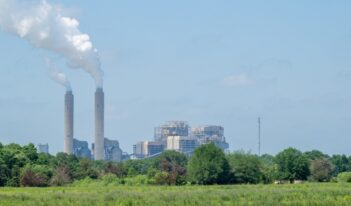
House subcommittee hears economic and health arguments about fracking.
At a recent House subcommittee hearing, arguments about how to balance economic growth with environmental health and safety focused on the controversial practice of hydraulic fracturing or “fracking,” an innovative way to extract natural gas from underground shale.
The hearing featured testimony from representatives from federal, state, and local officials as well as a university scientist. Claims that fracking can release carcinogens in surface water and contribute to unhealthy air butted up against claims that fracking createsjobs and economic growth and can give the United States an energy output on par with leading fossil fuel producing countries.
Michael McKee, County Commissioner of Uintah County, Utah’s leading energy producing county, noted the positive economic effects of fracking. Responding to questions from Representative Gerry Connolly (D-VA), McKee noted that the unemployment rate in his county was only 4% (whereas the rate nationwide is about 8%). About half of Uintah County’s workforce is employed in the natural gas industry. Nationwide, the American Petroleum Institute claims nearly 4 million jobs and 385 billion dollars come from the natural gas industry, McKee said.
Robert Howarth , Director of the Agriculture, Energy, and Environment Program at Cornell University defended the need for regulating fracking. He claimed that certain carcinogenic chemicals in the fluids that are used in fracking to crack rocks and release gas can be carried into groundwater.
Howarth also warned that methane release into the air around the drill sites often results in ozone formation in concentrations surpassing those of large cities. He stated that ground-level ozone leads to nearly 30,000 deaths annually. Howarth also claimed the high levels of radon in Marcellus shale gas are of particular concern.
Representative James Lankford (R-OK), the chair of the House subcommittee holding the hearing, expressed skepticism that the Environmental Protection Agency (EPA) could prove as effective in regulating fracking as could state regulators. Lankford rhetorically asked witness Michael Krancer, the Secretary of the Pennsylvania Department of Environmental Protection, if geologic conditions in Utah, Pennsylvania, and Oklahoma were all the same.
Krancer, along with Lori Wrotenbery, Director of the Oil and Gas Conservation Division of the Oklahoma Corporation Commission, offered testimony in support of state regulatory oversight of fracking. Wrotenbery said that states face unique issues with respect to the fracking process, noting that her own state of Oklahoma has experienced water shortages.
Krancer defended Pennsylvania’s policies on fracking, citing Act 13 which has added new state controls on fracking. He also suggested that states can react more quickly and effectively. He referred to the federal government’s role in assessing water quality around fracking sites in Dimock, Pennsylvania, where the EPA tested 59 wells at a cost of nearly $1 million and found no contaminants.
Another point of contention at the House hearing stemmed from the 2005 Energy Policy Act, which gave the EPA jurisdiction only over fracking that uses diesel in its operations. Lankford took issue with what he said was EPA’s expanding definition of the word “diesel.”
Nancy Stoner, Acting Assistant Administrator for the EPA Office of Water, stated that while the Act mentioned the term “diesel,” it never defined it, which has prompted the EPA to use criteria from the American Chemical Society.
The hearing was convened by the Subcommittee on Technology, Information Policy, Intergovernmental Relations and Procurement Reform of the House Committee on Oversight and Government Reform.



